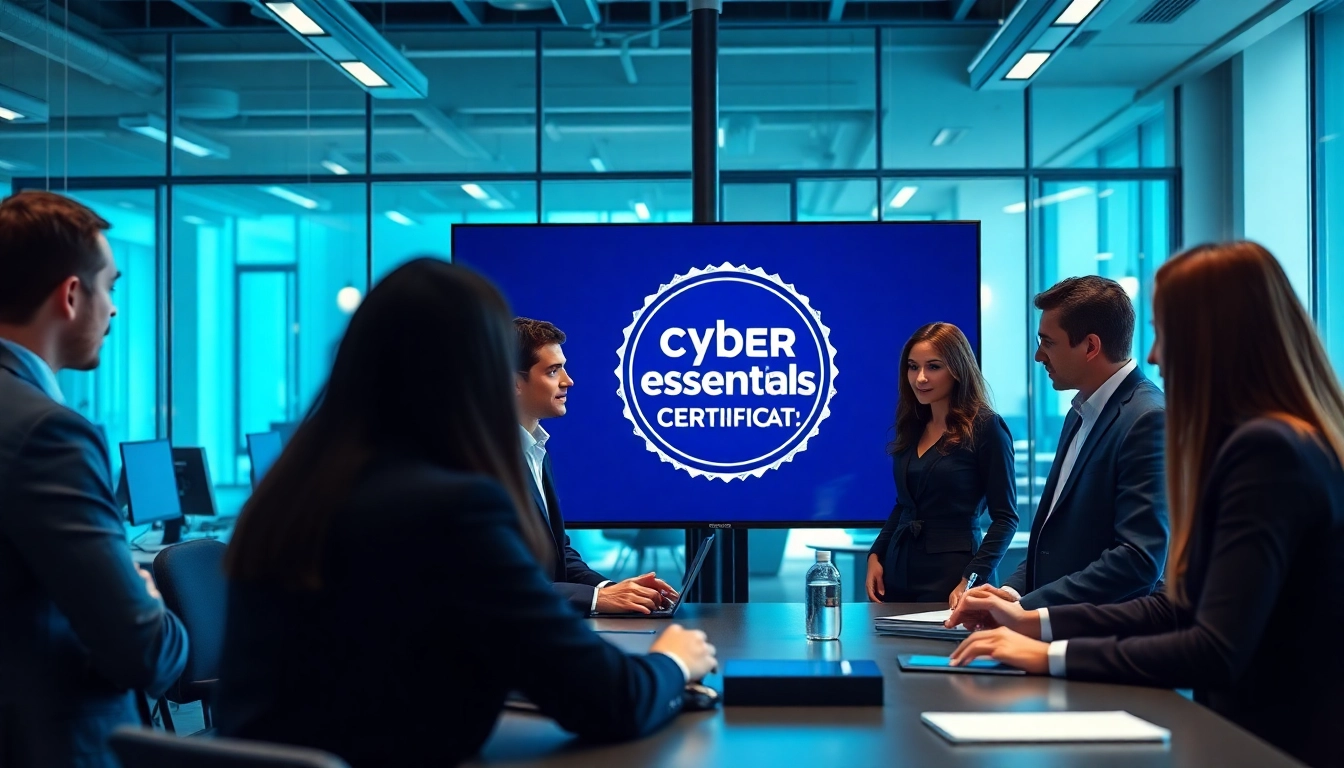
What is Cyber Essentials Certification?
In today’s digital landscape, protecting organizational data is paramount. Cyber Essentials Certification is a UK government-backed initiative designed to help businesses safeguard their systems against common cyber threats. This certification is not just a badge of honor; it’s a necessary measure for companies serious about cyber security. In essence, the Cyber Essentials Certification signifies that an organization has implemented a basic level of security controls to mitigate risks and protect sensitive data.
Overview of the Cyber Essentials Scheme
The Cyber Essentials scheme was developed in response to the growing frequency of cyberattacks and data breaches. Introduced by the National Cyber Security Centre (NCSC), it aims to establish a baseline of cyber hygiene across organizations. The scheme encompasses five key technical controls that are fundamental to creating a secure environment:
- Boundary Firewalls and Internet Gateways
- Secure Configuration
- User Access Control
- Malware Protection
- Patch Management
By following these guidelines, organizations can significantly reduce their vulnerability to cyber threats.
Importance of Cyber Security for Organizations
In today’s interconnected world, cyber security is critical for every organization, regardless of size or sector. Beyond complying with regulations, a robust cyber security posture ensures the protection of not only company data but also client information. The consequences of failing to implement adequate security measures can be devastating, leading to financial losses, reputational damage, and legal repercussions. Furthermore, as remote working becomes more commonplace, the necessity for effective cyber defenses grows, making certifications like Cyber Essentials vital in reinforcing an organization’s commitment to security.
How Cyber Essentials Certification Works
Achieving Cyber Essentials Certification involves following a structured process. Organizations begin by assessing their current cyber security measures, often using a self-assessment questionnaire to identify gaps. If necessary, companies can engage consultants to help them align with the technical controls required for certification. Once they’ve implemented the necessary measures, they submit their application for certification, which is then evaluated by an accredited certifying body.
Benefits of Cyber Essentials Certification
Protecting Your Business from Cyber Threats
The foremost benefit of obtaining Cyber Essentials Certification is the strengthened defense against cyber threats. With attacks becoming increasingly sophisticated, having a certification demonstrates that an organization employs an essential level of cyber security practices. Organizations that invest the time and resources into certification are better positioned to prevent data breaches and other cyber incidents, which can have severe financial and operational impacts.
Gaining Customer Trust and Confidence
Possessing Cyber Essentials Certification can significantly enhance your organization’s reputation. Customers are becoming more aware of data privacy issues and are likely to favor businesses that demonstrate a commitment to protecting their information. Displaying your certification can serve as a powerful marketing tool, providing prospective clients with the reassurance that their data will be handled securely.
Meeting Industry Standards and Regulations
In an era of increasing regulatory scrutiny, compliance with industry standards is more critical than ever. Cyber Essentials Certification not only helps businesses align with national cyber security strategies but can also aid in meeting specific compliance requirements for various sectors. Many organizations find that Cyber Essentials Certification bolsters their eligibility for government contracts and participation in supplier networks, which increasingly demand proven security credentials.
Steps to Achieve Cyber Essentials Certification
Assessing Your Current Cyber Security Measures
A comprehensive assessment of current security protocols is essential to begin the certification process. Organizations should evaluate existing systems and identify areas of vulnerability while documenting their cybersecurity policies. Utilizing the self-assessment questionnaire provided by the NCSC can help pinpoint the gaps that need addressing before moving forward.
Implementing the Required Technical Controls
Once vulnerabilities are identified, organizations must implement the five key controls endorsed by the Cyber Essentials framework. Here’s a brief overview of each control:
- Boundary Firewalls and Internet Gateways: These devices serve as the first line of defense against external threats. They filter incoming and outgoing network traffic based on predetermined security rules.
- Secure Configuration: Ensuring that all systems and devices are configured securely reduces the risk of exploitation from unauthorized access.
- User Access Control: Limiting access to data and systems on a need-to-know basis minimizes potential risks associated with insider threats.
- Malware Protection: Anti-virus software and other malware detection tools should be deployed to detect and neutralize threats.
- Patch Management: Regular updates and patches for software and systems ensure that known vulnerabilities are mitigated promptly.
Addressing these areas significantly enhances the organization’s security posture and aligns their practices with Cyber Essentials requirements.
Submitting Your Cyber Essentials Application
After implementing the necessary measures, businesses are ready to submit their application for Cyber Essentials Certification. This typically involves completing a self-assessment questionnaire that will be reviewed by an accredited certification body. It’s crucial to ensure that all responses are accurate and reflective of actual practices, as discrepancies can lead to delays or denial of certification.
Common Challenges in Obtaining Cyber Essentials Certification
Understanding the Technical Requirements
The technical requirements outlined by Cyber Essentials can be daunting for organizations, particularly those without a dedicated IT team. Misinterpretation or lack of understanding can lead to compliance challenges. To mitigate this, organizations should consider seeking guidance from experienced consultants who can provide clarity on implementation strategies.
Navigating the Self-Assessment Process
The self-assessment process can be overwhelming, especially for smaller organizations that may lack the necessary expertise. To ensure successful navigation, businesses should take time to familiarize themselves with the self-assessment questionnaire’s structure and guidelines. Providing adequate training to relevant staff can also facilitate a smoother assessment process and promote a culture of ongoing compliance.
Addressing Organizational Resistance to Change
Implementing new cybersecurity measures often meets with resistance from staff who may be hesitant about change. To foster acceptance, organizations should communicate the benefits of Cyber Essentials Certification clearly. Engaging staff through training sessions and feedback opportunities can also build a culture of security awareness, turning compliance into a shared organizational goal rather than a chore.
Maintaining Cyber Essentials Certification
Regular Risk Assessments and Updates
Maintaining Cyber Essentials Certification is an ongoing commitment. Organizations should conduct regular risk assessments and updates to their security protocols to adapt to new threats and vulnerabilities. Staying proactive in conducting these evaluations ensures that security measures remain effective and relevant.
Staying Informed on Cyber Security Trends
The cyber threat landscape evolves constantly, making it imperative for organizations to stay informed about the latest trends and technologies in cyber security. Participating in training sessions, subscribing to cyber security newsletters, and engaging with professional communities can provide valuable insights and allow organizations to adapt their strategies as necessary.
Preparing for Renewals and Audits
Cyber Essentials Certification does not last indefinitely; businesses must prepare for regular renewals and compliance audits. Keeping thorough documentation and records of security practices will aid in expediting the renewal process. Additionally, organizations should be proactive in addressing any recommendations that arise from audits to ensure continuous compliance.






